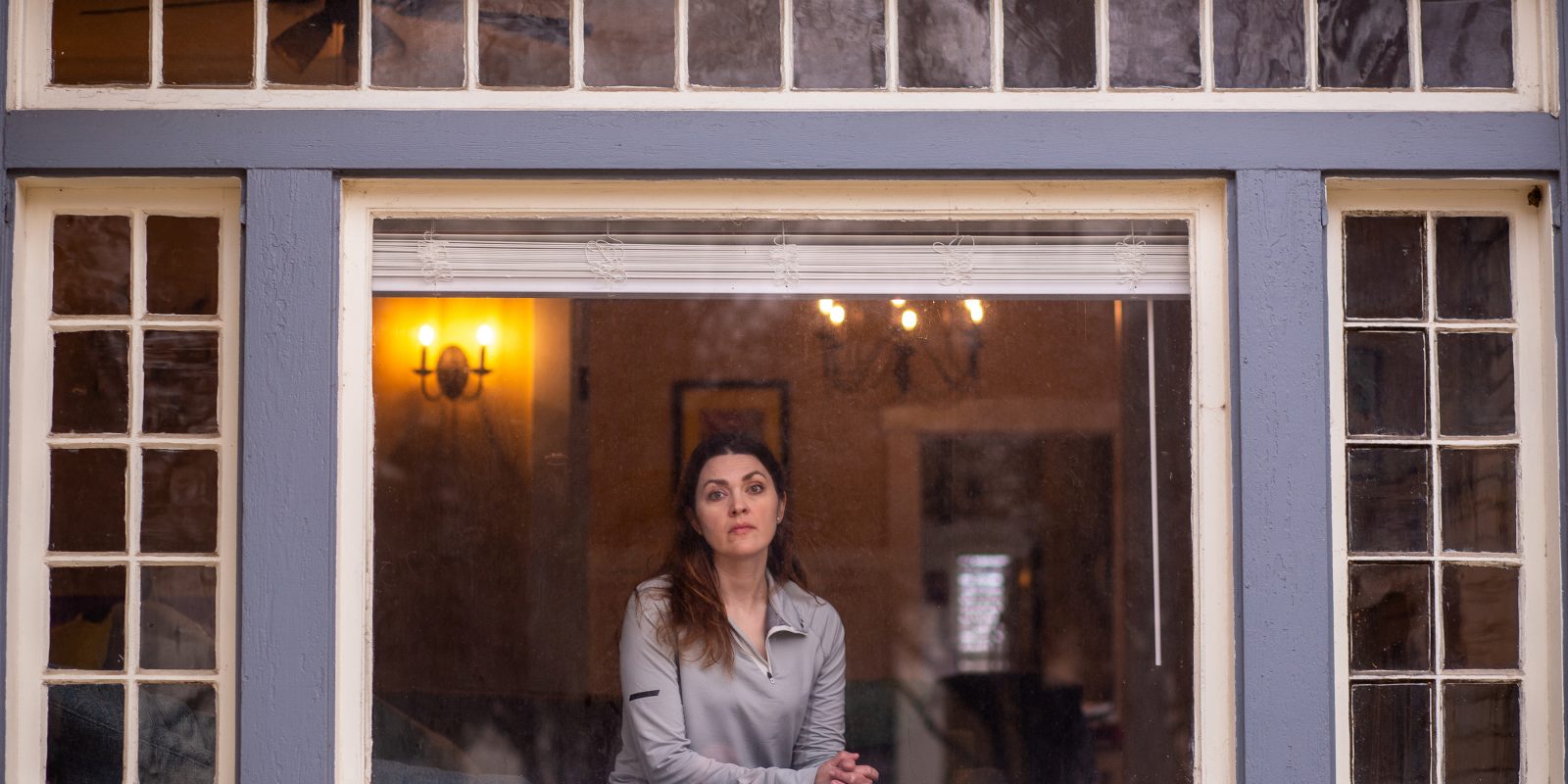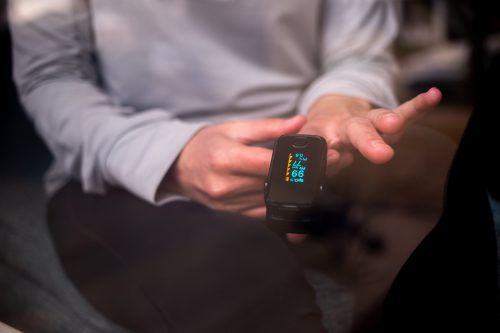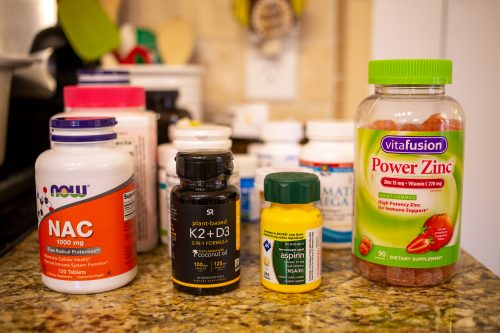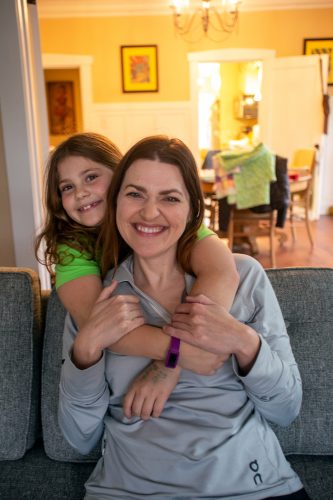
Sarah Angle, who has recovered from Covid, was isolated in her home with little contact with the outside world. A large picture window became a place for her to sit and connect as best she could. Photo by Mark Graham
Covid-19, Anxiety and Death
Surviving Covid-19 and learning to manage her anxiety changed Sarah Angle’s sense of self.
Four days before New Year’s Eve, Sarah Angle ’04 MS couldn’t get off her couch.
Sick with Covid-19, she barely had the energy to check the oxygen-level reader she had been carrying in her robe pocket. Shortness of breath and an unrelenting triple-digit temperature confirmed that she was seriously ill.

While battling Covid, Sarah Angle constantly used her pulse oximeter. Photo by Mark Graham
“I was scared I was going to die,” said Angle, an instructor of strategic communication. “I was thinking that I need to have a will. I was thinking that I need to tell my dad everything he needs to know about my whole life and all my affairs in case I die. And I was thinking about leaving my daughter.”
Her daughter, Amelia, is 9. “That was my biggest fear,” Angle said, “leaving her when she’s so young.”
Angle wasn’t alone in thinking she would die during the pandemic. As of April 27, the Johns Hopkins Coronavirus Resource Center found that more than 573,000 people in the United States had died of Covid-19.
“Covid is associated with heightened mortality concerns: that people are feeling particularly anxious about their death these days,” said Cathy Cox, associate professor and director of graduate studies in psychology. “And even if it’s not anxiety that people are dealing with, they’re definitely thinking about death.”
Managing the Terror
The foundation of Cox’s research is terror management theory, which describes the paradox between the self-preservation instinct and the understanding that death is inevitable. The opposition causes anxiety and fear.
When primed with thoughts of death — hearing a death count through the news, driving by a funeral home or cemetery — people often rely on symbolic buffers like holding their breath or saying a prayer. The behavior is a reaction to thinking about death and wanting to keep it at bay.
Julie Swets ’20 MS, a PhD student in experimental psychology, said having a sense of purpose that extends beyond the self can be a symbolic defense against anxiety. Examples include spreading religious or political beliefs, feeling joy at seeing offspring succeed or accomplishing a personal goal like writing a book or completing a degree.
“What’s happening now is that death salience is just constant. We’re constantly bombarded with news about death and dying and almost dying.”
Julie Swets
“When death is salient, you can sort of protect yourself with meaning and purpose and stability,” Swets said. “Instead of thinking about my own death, my own mortality, my own banality of life, I can think about how I have this larger sense of meaning beyond my own bodily self.
“What’s happening now is that death salience is just constant,” Swets said of the pandemic. “We’re constantly bombarded with news about death and dying and almost dying.”
For Angle, time with friends and family had been a helpful buffer against anxiety.
Yet months before she contracted the virus, she said, a pervasive worry crept in during her prolonged isolation. “I was sanitizing constantly, wearing my mask everywhere, social distancing like crazy. When it first started, it was so lonely because I didn’t see hardly anybody.”
A hole was opening in her symbolic buffer system — social connection — reducing its protective abilities over her anxiety about death.
In March 2020 she penned a personal essay, “Loneliness in the Age of Coronavirus,” for the Texas Observer. She wrote about her divorce and the vulnerability of single parents during a global crisis.
“I’ve always been relationship-oriented,” said Angle, faculty adviser for Roxo, TCU’s student-run advertising and public relations agency in the Bob Schieffer College of Communication. “The relationships with friends in my life and family and others, they are foundational to me, and they are what keep me feeling alive and connected, hopeful and inspired.”
On the Defense
Angle tested positive for coronavirus six days before Christmas in 2020. It started as a tickle in her throat, but the single mom chalked it up to allergies. Then the fever started.
Angle worried about all the people she had been around — her mother, daughter, sister-in-law, a friend, a friend’s daughter.
On Christmas Day, Amelia went to stay with her father.
In her 100-year-old Fort Worth home, Angle was alone with her thoughts.
“You kind of look back on the pieces of your life that you really, really loved and enjoyed and felt like you were successful and made a difference,” Angle said. “Then you reflect back on the pieces of your life that you regret or feel like you could have done better.”
She said she made deals and bargains with God. She promised to embrace life and not be scared if she survived.

Sarah Angle took vitamins and other medications, but nothing made her feel better. Photo by Mark Graham
She relied more on the personal relationships that had sustained her. Her friends, family and boyfriend video-called her and dropped off food as she battled Covid-19. Her dad became her caregiver.
But her once-reliable defenses — symbolic or medicinal — weren’t working. She took steroids, azithromycin, zinc and vitamins. Nothing made her feel better.
On day nine, she went to the hospital. The nurse took her temperature and tested her oxygen levels, but the emergency department would not admit her.
“The ER doctor said, ‘You’re recovering from Covid,’ ” Angle recalled. “I’m like, ‘This is recovering? This is not recovering.’ ”
When rational defenses against a mortal threat aren’t enough, Swets said, “you have this elevated accessibility of death-related thoughts.”
Those thoughts can spiral into debilitating anxiety.

During her grueling battle with Covid, Sarah Angle worried for her daughter, Amelia. Photo by Mark Graham
Confined to her house, Angle connected with a counselor to do meditative breathing exercises over the phone to help calm her. They also worked on reshaping her point of view about dying.
“He reframed the narrative in my mind,” Angle said. “He helped me realize I was scared and had anxiety and that anxiety was going to hurt my body a lot.”
The slow road to healing was the first sliver of a silver lining.
A Break in the Clouds
In her latest paper, “Death Concerns, Benefit-Finding and Well-Being During the Covid-19 Pandemic,” Cox and fellow researchers explored the link between coronavirus anxieties, fear of death and participants’ well-being. The team found that increased mortality concerns stemming from the pandemic were associated with an influx of hidden benefits — relationship investment, gratefulness, patience.
“We were able to demonstrate, in real time during a deadly pandemic, that people can learn and grow from adversity through gratefulness, patience, appreciation and by investing in themselves and others,” noted the paper, published in April by Frontiers in Psychology. Authors called for more research into the link between existential anxieties and finding silver linings to restore a sense of security post-pandemic.
Angle said the day she tested negative and was told she could be out and about again “was the best day ever.”
“Mental and physical health is first, above everything — above work, above family, above all things — because if you don’t have that you can’t do anything else.”
Sarah Angle
Months later, she still deals with residual consequences of the virus such as shortness of breath and heart palpitations.
“Having Covid and being that sick and really thinking I was going to die — I mean, I really did think that — it made me reprioritize what was important to me,” Angle said.
She said her sense of self has changed. “The silver lining of being so very, very sick with a disease that is very scary — that we still don’t understand as a country, as a world — is when you can come out the other side of that and think, ‘Damn, I did that. And I am still alive,’ and you’re OK with it.”
Now carrying a renewed sense of strength, Angle said she is taking life day by day instead of stressing about its unknowns.
“Mental and physical health is first, above everything — above work, above family, above all things — because if you don’t have that you can’t do anything else,” she said. “That was so omnipresent. I will not sacrifice that ever, for anything.”

Your comments are welcome
Comments
Related reading:
Alumni
Food Bank Director Leads During Pandemic
Julie Butner adapts to lead the Tarrant Area Food Bank during its hour of greatest need.
Alumni
Dennis Shingleton Uses Councilman Position to Battle Coronavirus
Decades of health care experience helped the veteran prepare Fort Worth for Covid-19.
Features
Roxo’s Message on the Panamanian Mangroves
TCU’s student-run strategic communication agency is helping to protect a vital and endangered resource.